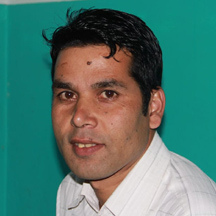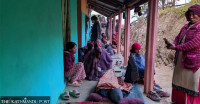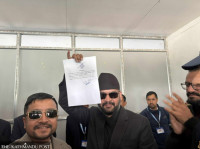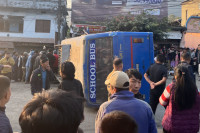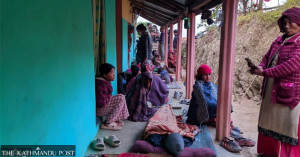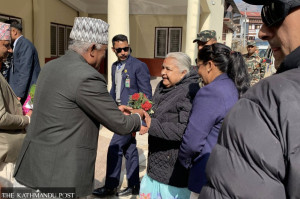Koshi Province
Government and Pathibhara cable car protesters start talks
No agreement was reached on Monday, but the two sides are set to meet again on Tuesday.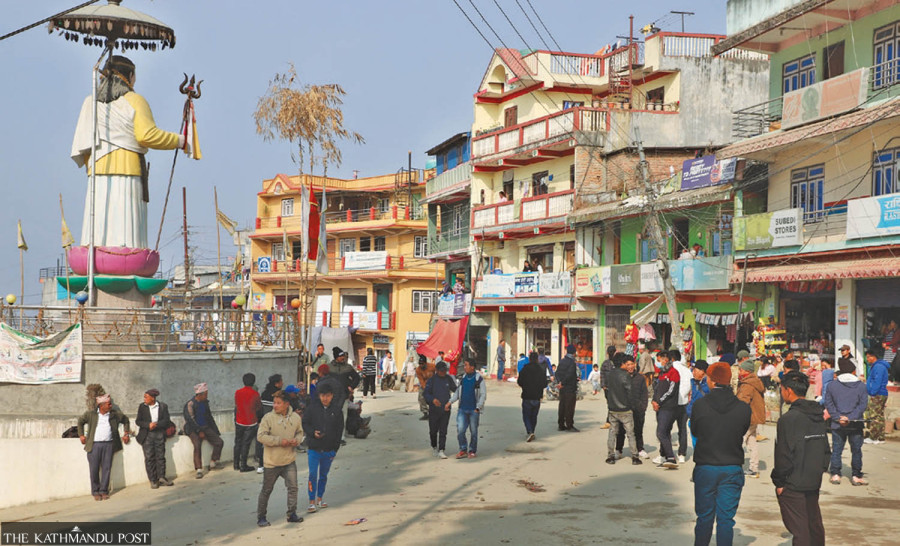
Ananda Gautam
Government representatives held talks with activists protesting against the Pathibhara cable car project in Lalitpur on Monday to resolve the longstanding dispute.
The government talks team led by Home Ministry Joint Secretary Prem Prasad Bhattarai and protesters’ team under the leadership of Amar Tumyahang sat for dialogue at the Kupondole-based Hotel Himalaya. Monday’s talks did not make any headways into resolving the dispute and both sides agreed to sit for talks on Tuesday.
The agitating groups who are protesting against the cable car project in Pathibhara area—known as Mukkumlung region in Kirati scriptures—formed a four-member committee early on Monday to facilitate talks with the government.
Responding to the government’s announcement of a talks team to negotiate with the protesters, the ‘No Cable Car Group’ formed the talks facilitating committee led by Tumyahang that comprises Ram Maden, Shankar Limbu and Saru Singhak.
Khagendra Phembu, coordinator of Cable Car Cancellation Joint Struggle Committee, said that the Tumyahang-led committee would coordinate with the government team to make a suitable environment for talks. “We had a clear stance to hold talks with the federal government,” Phembu said. “The government move to form a talks team is positive. However, the decisions made by the team led by the joint secretary cannot be implemented. So we have been demanding a committee be formed at the political level. We have formed the facilitating committee to hold discussion into this matter.”
The protesting group demands the cable car construction be halted immediately; unconditional release of Pradeep Maden, Chandra Sagar Limbu and Laxman Limbu, who were detained last week; and withdrawal of the Armed Police Force and Nepal Police teams from Kaflepati area to pave the way for talks with the government team.
Earlier, the protesters opposing the proposed cable car project in Pathibhara, located in the Mukkumlung region, criticised the talks committee formed by the Ministry of Home Affairs, claiming it was ineffective in resolving the dispute. They demanded the formation of a political-level team, viewing the issue as political, not something to be handled by bureaucrats.
“We welcomed the initiative taken by the federal government positively, but the talks committee should have been at a political level,” said Prem Ekten, central chair of Kirat Yakthung Chumlung, one of the organisations leading the protests. “With one bureaucratic representative leading the talks team, this issue cannot be solved.”
The government announced a talks team on Sunday evening, led by Home Ministry Joint Secretary Prem Prasad Bhattarai, to negotiate with the cable car protesters. It will have representatives from the Ministry of Federal Affairs and General Administration; the Ministry of Culture, Tourism, and Civil Aviation; and the Ministry of Urban Development.
Various organisations and groups enforced the transport strike in nine districts east of the Arun river on Monday as well to protest the construction of a cable car in Pathibhara, a revered shrine in Taplejung district. The strike affected Taplejung, Panchthar, Ilam, Jhapa, Morang, Sunsari, Dhankuta, Tehrathum and Sankhuwasabha districts.
The protesters started a transportation strike in Taplejung district on January 28 to put pressure on the government to address their demands. The transportation strike was extended to eight other districts east of the Arun river on Sunday.
Taplejung and Panchthar districts were hugely affected due to a transportation strike on Monday. The demonstrators did not even let motorcycles and tempos ply along the road. The strike had a partial impact in Jhapa where violent clashes ensued on Sunday.
The protracted transportation closure in Taplejung has greatly affected daily life, mainly the farmers and those who needed to travel for health issues and other urgent work. The farmers complain that they could not sell their products like milk, green vegetables and poultries.
“My son’s wedding has been arranged for February 10 in Jhapa,” said Januka Sitaula, a teacher at Phungling-based basic school in Taplejung. “We had a plan to go to Jhapa and manage the necessary things. But we are unable to go due to the transportation strike.”
The protest, part of a broader movement against the cable car project in the Mukkumlung area, has escalated of late with the protesters claiming that the project would harm the environment, encroach on local culture, and disrupt residents’ livelihoods.
Violence erupted in Pathibhara on January 25 when clashes broke out between the ‘No Cable Car Group’ and security personnel. Two protesters were shot and injured, and several others were hurt in the confrontation, which took place at Baludanda, about one kilometre from Kaflepati.
A 2.7 km cable car is being constructed from Kaflepati in ward 10 of Phungling to the temple. The agitating groups and individuals have been demanding that Pathibhara Mukkumlung should be preserved in its original state, as it is the heartland of the Limbu community.
The Mukkumlung Struggle Committee, the Cable Car Cancellation Joint Struggle Committee, the Kirat Yakthung Chumlung, and some political forces advocating for identity politics including the Rastriya Janamukti Party and the Loktantrik Rastriya Manch have been protesting against the cable car project.
Claiming that Mukkumlung has been culturally encroached and transformed into Pathibhara, the agitating groups are demanding that the name Pathibhara be changed back to Mukkumlung.
They say that the Mukkumlung area is the traditional Mundhumi of the Limbu community. The agitators are against the construction of large infrastructure projects at the Mundhumi shrine.




 15.12°C Kathmandu
15.12°C Kathmandu